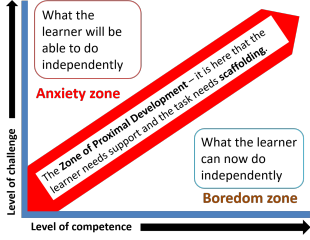Delta Module Two: meeting the teaching criteria | Section 6
 |
sensitivity
|
The criteria explained
 |
Group dynamicsThe criteria under section 6 refer to your relationship with your
learners. They are headed: |
Successful candidates demonstrate that they can effectively:
- teach the class as a group and individuals within the group, with sensitivity to the learners’ needs and backgrounds, level and context, providing equal opportunities for participation
- purposefully engage and involve learners
- vary their role in relation to the emerging learning and affective needs of learners during the lesson
- listen and respond appropriately to learner contributions.
 |
sensitivity |
 |
What assessors sometimes say: The candidate did not nominate sufficiently and allowed some learners to dominate feedback. The candidate seemed detached and unapproachable. |
In your plan, you should have identified any personality and social factors that you need to take into account with this group. Re-read what you wrote there well before the lesson and plan how you will actually do that.
Here are some ideas:
- Use your learners' names.
- Smile.
- Don't talk over your learners or put them down.
- Nominate by name so that all your students are involved. Do not rely on the strongest or most voluble for answers.
- Group students sensitively and re-group them so they get the chance to talk to other people. Plan how you will do this.
- Don't allow any learners to dominate feedback. Be firm with those you know will try.
- If you have a heterogeneous group with varied levels, make sure you differentiate tasks so that everyone benefits. You need to do this at the planning stage.
- Give students space to think and consider. Lively pace is important but not to the detriment of learning.
 |
engagement |
 |
What assessors sometimes say: This was a poor choice of text for these learners which did not engage or motivate. The tasks were completed during the lesson but were under challenging and did not stretch the learners. The text and tasks were too challenging for these learners and this led to disengagement and frustration. |
Partly, this, too, is a planning issue. Ask yourself some questions:
- Will the topic and the activities appeal to and engage your learners?
- Will your learners see a real benefit from learning the targets of the lesson?
- How will you make clear for your learners what progress they have made in this lesson?
- Will the concepts be adequately checked so the learners (and you) know that they are clear about what they are learning?
- Is the level of challenge right?
Too low and learners get bored; too high and they get frustrated
and discouraged.
Remember the Zone of Proximal Development:

Make sure you are operating in the red zone most of the time. - Do not be afraid to amend your plan if things prove too easy, too hard or uninteresting.
- Do not be afraid to vary your plan if things prove to be more interesting or more useful than you expected.
If you are using a listening or reading text, make sure you take a moment to elicit the learners' reaction to its content, not just its form. It is important that the learners engage with meaning.
 |
varying your role |
 |
What assessors sometimes say: The candidate was more comfortable during teacher-centred phases and did not sufficiently vary her role to allow her to support individuals and groups. The candidate dominated from the outset and did not allow learners to develop any autonomy or feel their contributions received adequate attention. |
When you look through the procedure grid for your lesson, take a moment to think about what you are doing and what your role is at every stage. Here are some questions to answer for each phase of the lesson:
- At this stage, what is my role?
Here are some possibilities but they won't all be relevant to
every lesson, of course.
- Assessor:
judging how well a task or a contribution has been achieved - Contributor:
taking part as an equal; responding to the content of what learners say - Counsellor:
advising on better ways to learn and caring for individuals with difficulties - Diagnostician:
identifying what the learners know and don't know, can and can't do - Disciplinarian:
keeping order and maintaining focus - Facilitator:
making things easier and helping the weaker learners in particular - Knower:
giving the right answers; supplying the language needed: not too much, not too little - Language resource:
helping out with re-casts and giving information about language and skills - Manager:
giving instructions and monitoring to make sure they are carried out; moving people around; changing interaction patterns - Observer:
seeing how people are getting on without interfering - Narrator:
telling an anecdote or relating an experience - Relationship builder:
maintaining a good rapport between you and the learners and among the learners
- Assessor:
- Should I be talking more or listening more?
- Who should I be talking / listening to?
- Have I thought about where in the room I should be?
- Do I know when and what I will use as concept-checking questions?
- If something's not working properly, how should my role change?
 |
listen and respond |
 |
What assessors sometimes say: The candidate was quick to recognise and correct errors but did not value or focus on the content of his learners' contributions. Learners' contributions were ignored when they did not match what the candidate wanted to hear. |
This criterion is not (mostly) concerned with how you handle error. That's part of it, but it is mainly to do with how you attend and react to what your learners say.
- Listen to the content of what your learners are saying and not just to the form. If something is interesting and needs a bit more time, take the time.
- Keep asking yourself if there's a way to incorporate what the learners say into the lesson.
- Listen hard and make sure you have understood what a learner actually says, not what you want to hear.
The teaching criteria sections and preparing to teach:
| Section 6 | Section 7 | Section 8 | Section 9 | Preparing to teach |
| relationships | language | procedures | management | visualising the lesson |
